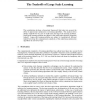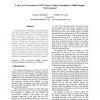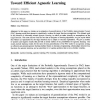329 search results - page 4 / 66 » Probably Approximately Correct Learning |
147
click to vote
FCT
2007
Springer
15 years 6 months ago
2007
Springer
We investigate issues regarding two hard problems related to voting, the optimal weighted lobbying problem and the winner problem for Dodgson elections. Regarding the former, Chris...
144
Voted
NIPS
2007
15 years 4 months ago
2007
This contribution develops a theoretical framework that takes into account the effect of approximate optimization on learning algorithms. The analysis shows distinct tradeoffs for...
136
Voted
ICDAR
2009
IEEE
15 years 10 days ago
2009
IEEE
We propose a low cost method for the correction of the output of OCR engines through the use of human labor. The method employs an error estimator neural network that learns to as...
COLT
1992
Springer
15 years 6 months ago
1992
Springer
In this paper we initiatean investigationof generalizationsof the ProbablyApproximatelyCorrect (PAC) learningmodelthat attemptto significantlyweakenthe target functionassumptions.T...
118
Voted
STOC
1991
ACM
15 years 6 months ago
1991
ACM
The study of self-testing/correcting programs was introduced in [8] in order to allow one to use program P to compute function f without trusting that P works correctly. A self-te...



